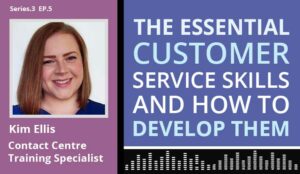We explore many expert ways to improve customer service skills – like active listening, empathy and knowledge – in the contact centre.
1. Focus on Connecting With People in Their Own Way
An advisor who is naturally curious about people and uses that curiosity to connect with people as individuals is likely going to have great customer service skills.
If the advisor is not naturally curious, any attempt to make an emotional connection with the customer will seem forced…
Coupling this with a desire to want the best outcome for your customer is great, as these advisors will naturally listen well, show empathy and work hard to help the customer.
On the other hand, if the advisor is not naturally curious, any attempt to make an emotional connection with the customer will seem forced and maybe even insincere.
So, you want to make connections by motivating advisors to try to understand the customer, in terms of their motive for calling, and you also want to find ways to relate to the customer’s feelings. That’s how to connect with people in the contact centre.
2. Seek First to Understand
One famous principle of the popular American educator Stephen Covey is to: “Seek first to understand, then to be understood.”
Yet in contact centres where advisors are pressured on time, it can be really hard just to take that minute, at the beginning of a call, to really understand where the customer is coming from. So think about how you can take that pressure away from your team.
Stop and think about the customer’s key motives for calling, rather than bulldozing ahead with your script or an assumption of the problem and how it’s affecting the customer.
As Sarah Morgan, Founder of Luceat Consulting, says: “Stop and think about the customer’s key motives for calling, rather than bulldozing ahead with your script or an assumption of the problem and how it’s affecting the customer.”
Making assumptions about the customer’s problem deprives the customer of the chance to get everything off their chest and can make the agent appear inattentive. It also takes away a chance for the advisor to show empathy and good conflict-resolution customer service skills.
3. Ensure Remote Working Doesn’t Disrupt Coaching
Just because most advisors are now working from home, that doesn’t mean that side-by-side coaching can stop.
Although these activities cannot be run with people physically sitting side-by-side, you can still schedule and run remote call listening and one-to-one coaching sessions, which advisors feel really invested in.
Remember, remote working often leads to a sense of isolation, so advisors will likely be pleased by the opportunity to engage with someone – even if that’s a team leader or a coach – via video call. This means that advisors will be more engaged with your coaching ideas for how they can personally improve their customer service skills.
Find out how else you can improve your contact centre coaching and training by reading our article: 50 Call Centre Training Tips
4. Make Employee Well-Being a Priority
Customers are often frustrated and sometimes they take it out on advisors, who are now mostly working from home, where they do not have the same support structures as a contact centre.
“Now that advisors are locked away at home, with less interaction with other people, it can be incredibly isolating, and mental health concerns can rise pretty rapidly,” warns Sarah.
With this in mind, you want to ensure that you are making well-being a priority in the new working environment, which you can do through:
- Offering a virtual emotional resilience workshop, which includes coaching advisors on how to deal with sources of stress inside and outside of working hours.
- Connecting advisors to one another in small virtual groups, which gives advisors 15–20 minutes to have a relaxed chat with their colleagues. The topics for the chat can be set – to keep advisors work-focused, or not – to give advisors a welcome breather.
- Run remote games and competitions between teams, which can include “most steps competitions” to add some fun into the daily routine and also encourage physical activity.
With a good approach to employee well-being, you can feel better assured that advisors are being well looked after and are in a comfortable environment to exhibit some great customer service skills.
For more on relieving stress and improving well-being, read our article: Employee Well-Being: How to Reduce Contact Centre Stress
5. Have Check-Ins With Employees – Not Check-Ups
Checking in on your staff, in a way that doesn’t make them feel like you’re checking up on them, is a key way to look out for their well-being and support them in improving their customer service skills.
So, how can you make sure that you are checking in, but not checkingup on your team?

It’s… about getting to know your people as individuals, knowing what works for them and giving them feedback in a supportive and nurturing way.
“I talked to one leader who said that he was going to have a catch-up with everyone at 9am and 5pm. But setting these times makes your team feel that you’re checking to see that they’re not in their pyjamas at 9am and that they are not ‘on the drink’ at 5pm,” says Sarah.
This example illustrates a leader checking up on their team, not checking in. Instead think about getting to know your people as individuals, knowing what works for them and giving them feedback in a supportive and nurturing way.
Remember, it’s not about asking everyone to get online at a certain time; treat your people as individuals instead.
6. Balance Your Scorecards
As our reader Jen tells us, it’s important to “Coach the behaviour, not the metric.”
The behaviours which exemplify great customer service skills need to be not only coached but included as key criteria in your Quality Assurance (QA) scorecard and shared with advisors.
Advisors need to have a good understanding of what this quality scorecard looks like and the customer service skills that they can personally improve.
Just ensure that your scorecard is balanced with customer satisfaction, so you are encouraging advisors to show the behaviours that are proven to make customers happy.
7. Encourage Peer Reviews
Share knowledge of how to improve customer service skills across the contact centre.
Encouraging peer reviews where advisors listen to each other’s calls and share advice is a great way to share knowledge of how to improve customer service skills across the contact centre.
These sessions might even be a quick video call between two advisors to talk through how things have gone, which not only helps to share knowledge and promote a learning culture, it also helps out team leaders, who would otherwise have to do that for everybody, every day.
Scoring one another’s calls is great in terms of improving customer service skills in a number of other ways too, as it allows advisors to:
- listen to examples of best practice in meeting certain QA behaviours
- discuss best practices with one another
- see how the call evaluation process works
Just make sure that, because people don’t have that face-to-face contact any more, they’ve still got methods of communication. They need opportunities to give advice and feedback – to other advisors, but also to management as well (and vice versa!).
8. Consider “Servant Leadership”
As a manager, a great approach for helping to improve customer service skills in your contact centre is a leadership technique called “Servant Leadership”.
This is a leadership mentality – based on the idea that your role is to serve your team, not to crack the whip or bang the drum – which is discussed in more detail by Sarah Morgan in the video below.
Servant Leadership really helps to provide “psychological safety” and creates an environment where advisors do feel comfortable in giving feedback, asking for support and taking the time to go the extra mile for customers.
Another great leadership idea to improve customer service is to create a service delivery vision for the contact centre and to rally your troops behind that – so everyone feels a purpose in reaching this great collective goal.
9. Think About How You Can Influence Employee Mindsets
An advisor’s ability to showcase great customer service skills comes down to their frame of mind and their motivation to put themselves in the customer’s shoes.
You can do lots of things to influence the employee mindset, to help them become more customer-focused, and one of those is to think about how you communicate your key performance indicator (KPI) strategy to your team.
Think about how you communicate your key performance indicator (KPI) strategy to your team.
Shifting from the historic “hit your numbers” mentality that often exists in contact centres to being much more human about it, with an emphasis on the long term, is definitely something to consider.
Advisors should focus on “how can I add value for the customer?” by gaining a better understanding of the customer and how to meet their needs. This will naturally improve their customer service skills, as advisors aren’t focused on hitting personal targets, but on the customer instead.
For more on educating advisors about KPIs, read our article: 5 Important Call Centre Metrics to Improve Agent Performance
10. Align Your Culture With a Purpose
Making sure that advisors really believe in your company’s mission, or at least finding elements of it that they can really resonate with, can be a great tool for motivating advisors to improve their customer service skills.
You should also look to describe the purpose behind why your advisors need to improve in certain areas – so they are motivated to improve their customer service skills.
To do this, you should be covering these three areas in coaching sessions:
- What you do
- How you do it
- Why you do it
This final part of “why” is key and is an area many coaches fail to consider. If you tell the team why it’s important to demonstrate a certain customer service skill on a call – and the purpose behind it – they’ll be much more invested in developing in that area.
For more on the topic of running a contact centre with a purpose, read our article: What Is the Purpose and Mission of Your Contact Centre?
11. Run “Sit Down With Sarah” Meetings
“Sit Down With Sarah” meetings were meetings that Sarah used to run when she worked as a contact centre director in order to better engage with the entire contact centre team.

Sarah Morgan
“One person from each team would join the monthly meeting, which would run for an hour, which was a total open-table discussion that would run without any sort of agenda on my side,” says Sarah.
“They could ask me anything they wanted. They could vent, there were no holds barred – with no other managers or team leaders in the room and confidentiality guaranteed.”
These meetings provided Sarah insight into the good, the bad and the ugly on the contact centre floor, while the meetings gave advisors an increased sense that they were cared about and that they had a voice. This is important in creating a positive culture that nurtures good customer service.
Each point that was raised would then be written down, addressed and passed back to the entire contact centre team in an email with:
- This is what I can do
- This is what I can’t do
- This is why.
12. Harness the Wisdom of the Contact Centre
Advisors won’t continue to develop their customer service skills if they are taught to stick to scripts rigidly or if they lack the support systems to help them out in tough moments.
These tough moments… are a great opportunity for an advisor to enhance their skill set.
In fact, these tough moments – when the answers that advisors are looking for are not in scripts or the knowledge base – are a great opportunity for an advisor to enhance their skill set. So, the support that we offer advisors in these moments is critical.
One great way to better support advisors on a tricky call is to harness the wisdom of your best advisors But this does not mean transferring the call. Instead, set up a team channel on an online application such as Slack – which is manned by your most skilled advisors – to offer in-the-moment advice to the advisor handling the call. That way advisors will know how to solve a similar query in the future and will have improved their customer service skill set.
13. Develop a “Master Label”
Helping advisors to feel that they have a sense of mastery, that they are developing their customer service skills and that they are getting better at what they are doing is a great way to encourage further improvement.
Throwing money and occasional bonuses at advisors will only provide short-term performance gains, whereas giving advisors a sense of mastery, autonomy and purpose will provide continuous motivation. This was outlined in Daniel Pink’s book Drive.
These three elements are really critical to people in the contact centre environment, and if we focus on the idea of mastery, we can engage advisors with this principle by:
- Appointing subject matter experts (SMEs) to train and support new advisors in mastering the key skill themselves. They can also coach other advisors in “lunch and learn” sessions.
- Recognizing and rewarding advisors who continuously exhibit a great skill. You can pick this up through quality monitoring.
- Giving people a sense of moving forwards by treating coaching sessions as a journey and showing them their progress, to reinforce their good development.
14. Document Employee Goals and Promises
What can work really well, in terms of improving customer service skills, is driving advisor accountability for their own development.
In coaching sessions it’s common to fail to drive this accountability by not documenting the actions that you’ve agreed upon – so you end up losing lots of great ideas for how you can develop an advisor’s customer service skills.
So, get those ideas written down in the session, preferably as specific actions that have been worded by the advisor – with dates for when the advisor wants to achieve that goal by, if applicable.
For more advice to improve your contact centre coaching sessions, read our article: 10 Great Ideas for Successful Call Centre Coaching Sessions
15. Give Advisors the Tools They Need
Having a method for an advisor to give feedback to a team leader about what is helping them to work from home and what isn’t working is key to ensuring that advisors are working in an environment that nurtures their ability to exhibit good customer service skills.
While most contact centres will understandably be thinking of cost efficiency right now, it’s important that you listen and work with advisors who are struggling with their work-from-home environment. If you don’t, they’ll become very frustrated.
So, talk to them about background noise, new systems and collaboration tools, and work together to think about how you can help them create a working environment where they can properly engage with their work.
For more on this topic, check out our article: Give Agents the Right Tools to Do Their Job
5 More Expert Ideas From Our Readers
To provide you with even more expert ideas for improving customer service skills, we wanted to share the following strategies from our readers, which have all worked well in their contact centre.
16. Establish a Buddy System
To help develop the skills of a new hire, create a buddy system where you pair a new advisor with an experienced, skilled advisor, who is their “buddy”.
Not only does this give you the chance to offer good advisors more responsibility – so you are developing them too – but it ensures that the new hire is mentored, encouraged and well trained.
Also, having a buddy is a great way to socially integrate the new advisor, so they feel part of the team and more engaged with contact centre goals.
Thanks to Mark
For more on buddying and mentoring advisors, read our article: Making Mentoring Work in the Contact Centre
17. Start a Hot Topics Programme
We started a programme called “Hot Topics” where our advisors let me know training topics they want/need from hearing what our customers are asking them about.
Advisors will have a sense of their own knowledge gaps, and we would meet monthly with an expert on that specific topic and learn for future customer experiences.
Remember, when advisors provide the training topics, that often results in more engagement.
Thanks to Vicki
18. Create a Shared Vision for a Super-Advisor
Engage your workforce to establish the best methods for developing and designing super-advisors. They’ll feel empowered and will have a sense of ownership.
This strategy will also make it feel more achievable for advisors to really get the hang of certain customer service skills knowing that the strategy came “from within”.
Thanks to Alex
19. Focus on Emotional, Mental and Physical Health
Focus on the health, emotional, mental and physical well-being of your contact centre team and they will take care of you.
Show your appreciation and that you care by connecting with advisors on a personal level.
You can show your appreciation and that you care by connecting with advisors on a personal level. Focus a bit on what they desire and need.
I have run businesses with this being a focus and it has been a huge success.
Thanks to Dawn
20. Set Up an Ideas Hub
We have an ideas hub that allows our advisors to put through new ideas around processes and engagement.
The team filters out the ideas to the subject matter experts (SMEs), who can action these ideas, as well as coming up with their own.
In addition, we have customer experts who gather customer feedback and come up with solutions to ideas put forward on how to improve customer experience.
Thanks to Lewis
For more great insights to improve customer service skills, read our articles:
- Customer Service Skills: How to Improve Empathy, Active Listening and Knowledge
- The Top 10 Most Important Customer Service Skills
- The Top Qualities for a Contact Centre Advisor
Author: Robyn Coppell
Published On: 16th Dec 2020 - Last modified: 15th Nov 2023
Read more about - Skills, Agent Performance, Coaching, Sarah Morgan, Soft Skills, Training



















